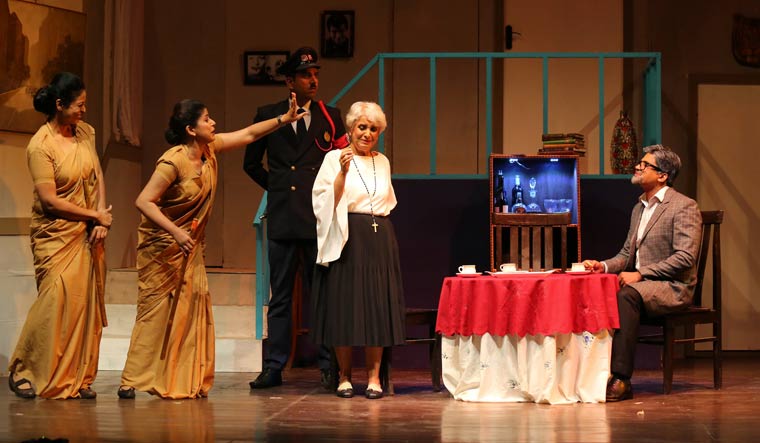Seventy-year-old Dheeraj Chand, a retired bank manager in Delhi, is chortling away at the Shri Ram Centre of Performing Arts (SRCPA) as he takes in a scene from the Hindi adaptation of the American play Arsenic and Old Lace. "Ab ek aur budha marega (One more elderly guy will be bumped off)," he proclaims aloud from his seat gleefully. The grandfatherly gentleman, Chand, is comfortably settled in his life with a thriving household—pension, married kids, a doting wife, grandchildren and the works. He has skipped the eagerly-awaited India-Pakistan World Cup match this evening to indulge in his passion for theatre. "I get enough money now to just spend on things I like. I come to Shri Ram every Sunday to watch a play," says Chand. He is not the least unsettled by the central plot premise in the dark comedy—a pair of wacko aunts who knock off lonely old men as a social service to humanity at large. "It is sad there are old people who have to live alone. I am lucky. I have everything with god's grace," he says.
Stage classic Arsenic and Old Lace—written by Joseph Kesserling in 1939 and performed on Broadway for the first time in 1941—belongs to the legion of jaded old comedies which might fail to excite a busy drama critic today. It has been endlessly adapted the world over—-on stage, television, radio, schools and colleges. Most theatre aficionados have seen it at least once. But what is it like watching it with an audience peppered with a hearty sprinkling of grizzled old grey-heads? The dark, macabre humour at play suddenly starts to appear delightfully more sinister. It's like aunts cackling with laughter so deep and guttural, they are mocking our foolish concerns, as if you young folks can't swallow the bitter truth.

In the play, two spinster aunts from the Brewster family in Brooklyn mix arsenic in the elderberry wine they offer to guests of a typical profile—old men who do not have a family to go back home to. In their warped logic, it constitutes mercy-killing. The sane nephew—a theatre critic and the hero of the play—concocts one bumbling plan after another to save his beloved aunts from being caught while also struggling to come to terms with the shocking truth about his homicidal family which includes a murderer-brother on the run with his accomplice. The best-laid plans are disrupted when this fugitive-brother descends out of nowhere to hide in his estranged family house. When he discovers how his refined old aunts are killing and burying one dead body after another in the basement, he finds the perfect excuse to prolong his stay and bedlam ensues. Typical example of a "poison-in-jest" comedy.
In this Hindi production of SRCPA, directed by Nayana Sagar and shown as the concluding play of their Summer Theatre Festival, the scene shifts to Vasai near Mumbai with the strain of madness running in the D'Silva family. Aunt Martha and Rosa have already knocked off 12 old gentlemen who came calling, looking for rental accommodation. The aunts employ a schizophrenic nephew, Alfie, who thinks he is Hitler and who can only be convinced of burying the victims once he is told they were Jews gassed at Auschwitz. And then there is Bobby, the reluctant drama critic, and Jonathan, the murderous brother with a cosmetic surgeon doctor as accomplice. Performances are average at best, but on the whole the play works with one madcap twist after another which is bound to regale a first-time viewer of Arsenic and Old Lace. There is old-school comfort and grace in a simulated drawing-room on stage and there are a few sharp performances by the likes of Jonathan, Aunt Martha and the hapless doctor. Performed for the sixth time, there are repeats of SRCPA's Hindi Arsenic and Old Lace lined up the next few months.

For Sagar, there are no criminals or innocents, only intriguing characters. Her job is to present the story as the author had visualised it and let the audience take what is relevant to them. According to her, the play operates on the principle of what in German theatre is called schadenfreude, which is pleasure derived from someone's pain. "It is one of the darkest comedies I have seen. A guy is struggling to come to terms with the criminality of his aunts. But the way he goes about trying to preserve that innocent space where the aunts tell him 'this is god's work for us. It is social work'. That innocent space in which they are existing, he understands that and he doesn't want to disturb it. That is the commendable, redeeming aspect of the story. It is his care and affection for the old ladies," says Sagar.



